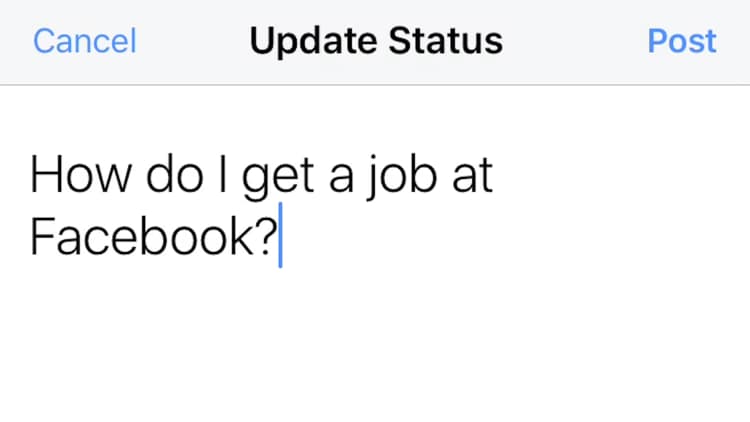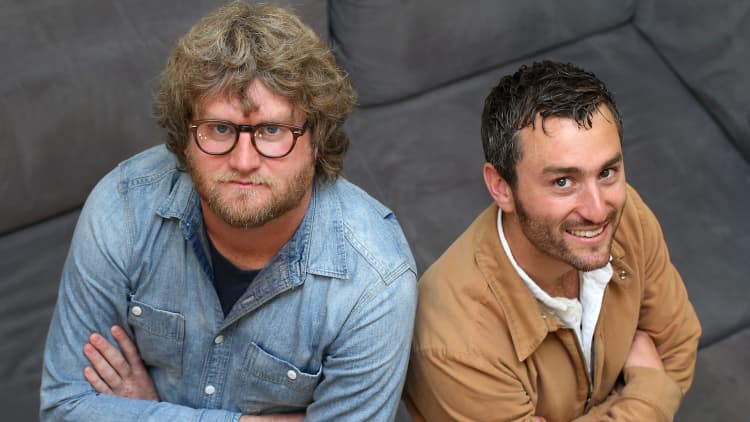Most of us don’t know what it’s like for an out-of-the-blue great idea to turn into a billion-dollar company. But history has proven time and time again that a light bulb moment or finding a seemingly simple solution to a common problem can change entrepreneurs’ lives.
From a forgotten wallet changing the way we exchange money to a group of college kids who just wanted to look up their classmates online, here are five examples of billion-dollar start-ups that were conceived practically by accident.
Venmo
Laziness and forgetfulness were the inspiration for Venmo, the mobile payments app that handled $12 billion in transactions over just the first three months of 2018.
In 2009, Venmo co-founders Andrew Kortina and Iqram Magdon-Ismail were at a funk concert in Philadelphia, where they’d met as students at the University of Pennsylvania before graduating in 2005. At the concert, the pair watched from a balcony and talked about the idea of sending money to other people using just their phones because they were “too lazy” to go downstairs to tip the house band after a good performance, Magdon-Ismail said in an interview in 2016.
Weeks later, Magdon-Ismail forgot his wallet at home in Philadelphia when he went to visit Kortina in New York City. After that moment of forgetfulness, Magdon-Ismail said Kortina and he decided that their earlier idea to make mobile payments with a phone app connected to your bank account was worth developing into a reality.
“Sometimes building something that directly improves your life is a great way to invent something that improves the lives of others,” Magdon-Ismail said in 2016 about Venmo’s conception, according to Entrepreneur.
In 2012, Venmo sold to online payments company Braintree for roughly $26 million. Just a year later, PayPal bought Braintree for $800 million. As of last year, Venmo had an estimated 7 million users, and the mobile payments app is on pace to handle nearly $50 billion-worth of transactions in 2018.
Slack
Cloud-based workplace chat platform Slack was founded in 2013 by Stewart Butterfield, the co-founder of photo-sharing site Flickr, which he and his wife had sold to Yahoo for a reported $35 million in 2005.
But despite Butterfield’s previous tech success, Slack’s development was practically an accident.
Butterfield had founded a gaming company, called Tiny Speck, in 2009 and hired a team of developers and artists to create an online multiplayer adventure game called Glitch. Tiny Speck spent multiple years developing the game, which eventually launched online in September 2011, only to be shut down a year later due to a lack of interest from online gamers.
However, while working on Glitch, Butterfield and a group of developers actually created something different: a workplace collaboration tool that allowed them to communicate with each other even though Tiny Speck’s team of software developers and game designers were scattered across San Francisco and Vancouver. Tiny Speck’s employees had worked on the internal chat tool in their spare time while working on Glitch, constantly adding features over the course of a few years, including a mixture of public and private chat channels along with support for emojis.
Cal Henderson, a programmer on Butterfield’s team who is now a Slack co-founder and its chief technology officer, called the creation of Slack a “happy accident” in a 2016 interview with The Guardian.
“We were initially building a game called Glitch and our team was spread between San Francisco and Vancouver,” Henderson said. “We needed to communicate easily; not just programmers, but artists, animators and sound designers. We needed to collaborate and swap assets and we had to be notified when things progressed.”
After shutting down Glitch, Butterfield’s team pivoted to prepare the chat tool, which they called Slack, for a public launch. Butterfield shared the program with friends at other Silicon Valley companies, including music streaming service Rdio, which was one of the first companies to adopt Slack. Soon, Slack had taken off as a buzzy new program in the tech world and other industries. Two months after launching, the software was already in use at companies like Pandora, Rhapsody, Venmo, BuzzFeed, Medium, Business Insider, and many more, Butterfield told Pando at the time.
Slack kept growing from there, with the software boasting more than 8 million daily users as of May, including 3 million business users who pay for the company’s enterprise service. As of September 2017, 43 percent of the country’s 100 largest companies were using Slack. The company has raised over $840 million in outside funding, as of September, for a valuation of $5.1 billion.
Did Mark Zuckerberg and his group of fellow Harvard classmates know in 2004 that they were creating a social networking giant that would one day boast over 2 billion users, making some of them multibillionaires, while also inspiring furious debate over issues like online privacy and misinformation?
Well, to hear co-founder Dustin Moskovitz tell it, Facebook’s origins actually seem pretty innocent. Moskovitz, who served as Facebook’s first Chief Technology Officer and later left the company in 2008 to found the workplace management app Asana, talked about Facebook’s early days in an interview for the book, “Valley of Genius: The Uncensored History of Silicon Valley. (Wired published an excerpt from the book on July 10.)
“Back then there was a really common problem that now seems trivial,” Moskovitz says in the book. “It was basically impossible to think of a person by name and go and look up their picture.” While the idea of a college “freshman face book,” a catalog of students with their photos and information, already existed in some form at Harvard and other schools, they were often limited by dorm, or not accessible online. “So we decided to create a unified version online and we dubbed it 'The Facebook' to differentiate it from the individual ones,” Moskovitz says.
Thousands of people had signed up for the site in a matter of weeks, Facebook CEO Mark Zuckerberg says in that same book: “And we started getting emails from people at other colleges asking for us to launch it at their schools.”
And, of course, the site only grew from there, reaching 1 million users around the world by the end of 2004. Today, Facebook has a market value of more than $600 billion and Zuckerberg is third on Bloomberg’s ranking of the world’s richest people, with a net worth of $84 billion.
In April 2004, in an interview with CNBC (his first-ever TV interview), this is how Zuckerberg described Facebook: "[Y]ou can browse around, and see who people's friends are, and check out people's online identities, and see how people portray themselves and just find some interesting information about people."

Twitter, the social network with over 330 million monthly users, only came into existence because the employees of a failing podcasting service needed to pivot. The failing company was Odeo, a service launched by Noah Glass and Evan Williams in 2005 to allow users to create and share podcasts online. A year later, though, Apple’s successful introduction of its own podcasting platform had forced Odeo’s founders to think of a different path rather than competing with the tech giant.
According to current Twitter CEO Jack Dorsey, who was working as a coder at Odeo, Williams decided to hold a brainstorming session with Odeo’s founders and employees to find ideas for a new direction for the company. Dorsey suggested the idea of a sort of SMS (a text-messaging service) that shares users’ status updates with a select group of followers.
Dorsey has described selling his initial idea to his Odeo bosses as an "idea so simple that you don't even think about it—you just write."
Glass and Williams liked the idea and, thus, Twitter was born. Glass, Dorsey and fellow programmer built the site’s prototype in just two weeks, according to The Verge, and they picked the name “Twitter” out of the dictionary (though, it was initially called “Twttr” before the company bought the domain “twitter.com”).
“We came across the word "twitter," and it was just perfect,” Dorsey told the Los Angeles. “The definition was "a short burst of inconsequential information," and "chirps from birds." And that’s exactly what the product was.”
In August 2007, a small earthquake hit San Francisco where the company was based. As word of the event spread via Twitter, it was "an early 'ah-ha!' moment for users and company-watchers alike," reported Business Insider, gaining the platform thousands of users and helping to solidify its viability.
That year, Williams and Glass sold Odeo’s podcasting business to SonicMountain for around $1 million. Meanwhile, the business they stuck with at the time, Twitter, now has a market value of over $32 billion.
Tumblr
Founder David Karp threw together the prototype version of his microblogging and social networking site during a two-week window between freelance consulting gigs. Karp started working as a web developer at the age of 14 at the online parenting forum UrbanBaby and animation company Frederator Studios, where he built a blogging platform.
In 2006, at just 20 years old, Karp was running his own web consulting operation building websites for clients. At one point that year, during a two-week window between freelance jobs, Karp decided to take a stab at creating his own platform for short-form blogging.
Karp, who worked on the project with engineer Marco Arment, said in 2012 that he told Arment at the time, simply, “Let's see what we can put together in the two weeks before our next gig.”
The crude version of Tumblr the pair built in that two-week gap spent a few months in a private Beta version before launching as a free blogging platform for the public in early 2007. After two weeks, 75,000 people had already created their own blogs, Karp told Wired, with tech-savvy user especially drawn to the platform’s customization tools. “It attracted this spectacular community of designers and hackers. Over the next few weeks, they built gorgeous things on Tumblr that didn't look like anything else on the internet. That still defines Tumblr to this day,” Karp said in 2012.
Karp shut down his consultancy in 2007 to focus on Tumblr, which today hosts more than 420 million blogs and has seen over 162 billion posts. In 2014, Yahoo paid $1.1 billion to acquire Tumblr. Karp remained CEO of Tumblr (which is now a subsidiary of Verizon’s Oath unit, which houses Yahoo and AOL) until he left the company, at the end of 2017.
Today, the Tumblr acquisition is mostly seen as a failure for Yahoo, which was never able to generate much advertising revenue from the site.
Don't Miss:
Here's what Mark Zuckerberg says he would do if Facebook hadn't worked out
Like this story? Subscribe to CNBC Make It on YouTube!


